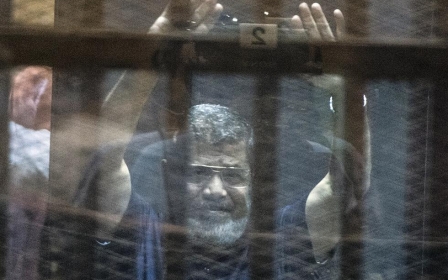Leaked recording flouts court ruling sentencing Morsi to death

A freshly leaked audio recording of former Egyptian military commander in chief Sami Annan provides further evidence that the sentencing of former president Mohamed Morsi to death over charges of espionage lacks credibility.
In the leak published by the opposition satellite channel Mekameleen TV on Friday, one day ahead of Morsi's court trial, Anan is asked by Judge Ahmed Refaat if he was notified by the military intelligence agencies that Hamas or Hezbollah members carrying weapons had infiltrated Egypt through the border tunnels.
“This information was never presented to me nor to the council [SCAF]. I never heard of this before,” affirmed Annan in the audio tape.
The judge went on to ask Annan in an interrogation-style conversation if, during the recent period and during the 2011 uprisings, military intelligence agencies had intercepted members of Hezbollah, Hamas or other foreign groups trying to infiltrate Sinai.
Again Annan replied with an affirmative: “No we did not.”
Morsi was handed, along with tens of members of the Muslim Brotherhood, a death sentenced on Saturday, in what many international observers described as kangaroo and politically charged trials that lack due process.
Morsi was sentenced to death by an Egyptian court for his alleged role in a 2011 jailbreak known as the Wadi al-Natroun case after being imprisoned, along with several other Brotherhood members, by the government under Hosni Mubarak.
Among the charges, Morsi and other Brotherhood leaders were accused of smuggling out plans of their high security jail to members of Hamas, the Iranian revolutionary guards and Hezbollah. The military court alleges that sharing prison plans with members of these groups is a form of espionage.
On 28 January 2011, three days after big demonstrations broke out against Mubarak, Morsi and the others were left in a state of confusion when thousands of inmates were surprisingly let loose while police and security personnel conspicuously disappeared off the streets of the capital.
In an audio interview by Aljazeera on the eve of the Wadi Natroun prison break, Morsi clearly stated that while a group of unidentified men had broken into the prison, helping inmates escape, he along with seven other members of the Brotherhood Guidance Council chose to remain in their cells.
“We are telling you now and we are telling the world, we will not flee,” Morsi said at the time.
“If there is an official in Egypt that wants to get in contact with us, we’re here… we will never run away,” he said.
The other charge is that beginning in 2005, the top Muslim Brotherhood leadership began conspiring with Hamas to throw the country into turmoil, a plan that resulted in the 25 January 2011 revolution.
Commenting on the charge, Juan Cole wrote in a piece published on Sunday: “That Mubarak was overthrown by the Muslim Brotherhood or more precisely by the Palestinian Hamas organization is an absurd proposition.”
During the Saturday trial, several Palestinian defendants, two of which were already dead and one of which has been in prison for the past 19 years, were also handed a death sentence by the Egyptian court.
The death penalty for both cases will be confirmed at a later hearing after receiving the approval of the grand mufti, who is the official interpreter of Islamic law. The final decision will be reached on 2 June.
Stay informed with MEE's newsletters
Sign up to get the latest alerts, insights and analysis, starting with Turkey Unpacked
Middle East Eye delivers independent and unrivalled coverage and analysis of the Middle East, North Africa and beyond. To learn more about republishing this content and the associated fees, please fill out this form. More about MEE can be found here.



